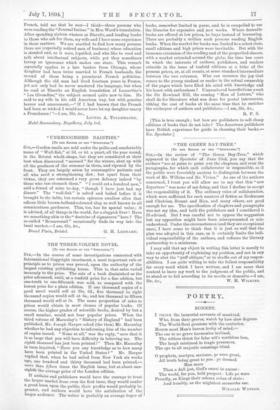THE THREE-VOLUME NOVEL. [To THE EDITOR OF TUE " SPEOTAT031."]
Sin,—In the course of some investigations connected with International Copyright enactment, a most important rule or principle as to prices was proved, upon the authority of the largest existing publishing house. This is, that sales varied inversely to the price. The sale of a book diminished as the price advanced, until, at a tenfold price for a fine edition, but one-tenth to one-fifteenth was sold, as compared with the lowest price for a plain edition. If one thousand copies of a good novel would sell at 31s. 6d., five thousand to eight thousand copies would sell at 6s., and ten thousand to fifteen thousand would sell at 3s. The same proportion of sales to prices would obtain in most classes of popular books. Of course, the higher grades of scientific books, desired by but a small number, would not bear popular prices. When the third volume of Macaulay's "History of England" had been published, Mr. Joseph Harper asked (the then) Mr. Macaulay whether he had any objection to informing him of the number of copies issued. " None at all," was the reply, " save that it is so large that you will have difficulty in believing me. The eighth thousand has just been printed 1" Then Mr. Macaulay in turn inquired, "Have you any knowledge as to how many have been printed in the United States ? " Mr. Harper replied that, when he bad sailed from New York six weeks ago, one hundred and thirty thousand had been printed,— 7ore than fifteen times the English issue, but at about one- eighth the average price of the London edition. If authors and publishers would have the courage to trust the larger market from even the first issue, they would confer a great boon upon the public, their profits would probably be greater, and authors would have the satisfaction of the larger audience. The writer is probably an average buyer of books, somewhat limited in purse, and he is compelled to use the libraries for expensive and new works. Where desirable books are offered at low prices, he buys instead of borrowing. There are probably a million such persons reading English books. When the market for books was limited to a select class, small editions and high prices were inevitable. But with the immense extension of the reading and of the propertied classes, with a market extended around the globe, the time has come in which the interests of authors, publishers, and readers coincide in the issue of tenfold editions at a tithe of the present prices, or, at all events, at some standard intermediate between the two extremes. Who can measure the joy that comes to the young student or reader in the actual ownership of the pages which have filled his mind with knowledge and his heart with enthusiasm ? Unnumbered benedictions await the Sir Rowland Hill, the coming " Man of Letters," who shall do for literature what was done for postal intercourse, tithing the cost of books at the same time that he enriches the exchequer of authors and publishers.—I am, Sir, &o., R. P. S.
[This is true enough ; but how are publishers to sell cheap editions of books that do not take ? The American publishers have British experience for guide in choosing their books,— En. Spectator.]










































 Previous page
Previous page